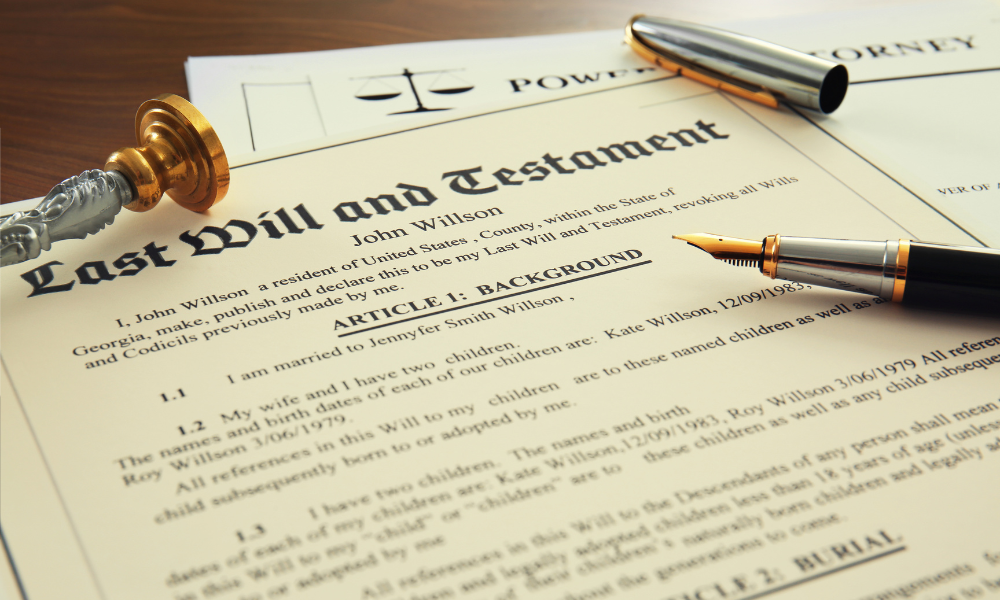- On what grounds can you contest a will in Canada?
- Who can dispute a will?
- When to dispute a will
- Process for contesting a will
- What happens if estate dispute grounds are proven?
- How long does an executor have to settle an estate in Canada?
- Can an executor decide who gets what in Canada?
- How lawyers can help resolve estate disputes
Last will and testaments are like a final letter of a loved one after death. This outlines how they want to divide and distribute their assets to the people they leave behind. As a rule, the law respects the wishes of the deceased and guarantees compliance with the will. However, certain requirements must be met to make the will operative.
In some cases, wills are contested by an heir or a person claiming to be an heir. If this happens, the law steps in to help determine and interpret the true intention of the person who wrote the will, also known as the “testator.”
On what grounds can you contest a will in Canada?
Contesting a will in Canada must meet stringent requirements of law. After all, the last will is the final desire of the deceased and voiding or altering it must be made only if there’s sufficient evidence. Grounds for disputing a will can be categorized into two groups: intrinsic and extrinsic validity.
Intrinsic validity refers to problems with the testator while extrinsic refers to the form of the will itself. Here’s a helpful video about validity of wills in Canada:
Currently, the following grounds may be used to file an estate dispute:
Undue influence
Undue influence is when the testator is unduly influenced by a third party when writing a will. The important term here is “undue,” which translates to excessive pressure compelling a person to write a will in a certain way. Undue influence can be judged through different factors such as the status of the testator or the relationship of the third party.
Undue influence can exist if the testator is heavily influenced at the time the will was written. For example, there can be undue influence if the person benefiting from the will is the testator’s lawyer, nurse, doctor, or some other person in their life who has disproportionate control over the testator.
Lack of capacity to make a will
A will dispute may also happen if the testator does not have the cognitive ability to manage their affairs at the time the will is made. This is slightly like undue influence except the testators themselves are not of sound mind. A typical example would be seniors or those who have mental difficulties like dementia or Alzheimer's.
In both cases, it may be argued that the testator did not understand what they were doing when executing the will. Hence, they did not have the ability to consent to its contents, voiding the will completely. Here’s a clearer picture on how mental capacity affects wills:
Need more information about technical legal concerns? Visit our Legal FAQ page for updates!
Testator’s intentions are unclear
If the will is vague or contains conflicting desires, an estate dispute may be filed. A good example is if the will grants the wife exclusive rights to Property A but also grants the same rights to a brother or sister. In these cases, the courts step in to determine the real intention of the testator and harmonize the will if possible.
For testators, this is often resolved by ensuring that the will is prepared by estate planners or someone who has experience in the process. This helps ensure that their wishes are communicated clearly.
Mistakes or non-compliance with formal requirements
To understand this ground for estate dispute, it’s important to first introduce the concept of holographic and formal will. A holographic will is handwritten entirely by the testator and has their signature at the bottom. Formal wills are executed with the help of lawyers and acknowledged before notaries.
Estate disputes based on non-compliance with formal requirements usually apply to formal wills. It can be because the will does not have witnesses or there are mistakes in the preparation of the document. Of course, holographic wills may also be contested, usually on the basis that there is no signature, or the handwriting is not of the testator.
Fraud and forgery
In these cases, the estate dispute is based on an alleged misrepresentation. Perhaps the signature of the testator was forged, or the entirety of the will itself is fraudulent. It can also be raised if the last will was intentionally destroyed without the consent of the testator. Ideally, wills should be kept in safe places to ensure that they are carried out.
Who can dispute a will?
Any person with legal standing can file an estate dispute. But what does legal standing mean? Legal standing is essentially the people who will benefit or be injured if the will is executed. Hence, even persons not named in the will can file a dispute if they believe that they are entitled to a portion of the will.
Common persons who may file a dispute include the wife, the children, brothers, sisters, current beneficiaries, and beneficiaries of a previous will. It can also include persons who would have inherited if the person died intestate or without a will.
Note that the law on intestacy varies depending on the province. For these reasons, beneficiaries who want to contest a will must file it in the territory having jurisdiction over the will. This is usually the place where the testator lived prior to his death. Hence, a testator residing in Ontario must have his will contested through an Ontario lawyer.
Look through some of the best Ontario lawyers for estate planning if you need someone local.
When to dispute a will
Filing an estate dispute has a specific timeframe and would often depend on ground relief for contesting the testamentary act. Generally, though, the period is two years from the time the person knew or should have known of the death.
Certain jurisdictions have a much shorter timeframe. For example, dependents of the deceased may contest the will on the grounds that it provides inadequate support. In these cases, the contest must be filed within six months counting from probate.
Process for contesting a will
Disputing a will is often a long process, not to mention expensive. Payments usually start at $5,000 and can quickly increase depending on the complexity of the case or size of the estate. Once a beneficiary decides to launch an estate dispute, the following steps are taken:
1. Case build-up
The case build-up takes up a large portion of the estate dispute. This is the preparation stage where estate lawyers obtain a copy of the will, collect all evidence, prepare the notice, and arrange information in a way that persuades the court. The case build-up can take months if the necessary documents aren’t immediately secured.
2. File notice of objection
The next step is to file a notice of objection before the Court. This will contain all the grounds for objection of the applicant as well as any evidence they have on hand. Upon receipt, the court will suspend any activities related to the probate of the will. This suspension will remain until the objection has been settled.
3. Possible mediation
Parties in an estate dispute are encouraged to undergo mediation to prevent an extended court battle. Note though that a compromise between parties may not always be carried out if it is repugnant to the will or to the court.
4. Participate in court proceedings
Moving forward, court proceedings for estate disputes follow the pattern of most civil cases. The parties will be asked to file their respective pleadings, affidavits, and evidence to prove their claim. Once all arguments have been presented to the court, the court will take some time to decide on the case.
5. Court decision
The court will issue its decision based on all the evidence presented by the parties. If no appeal is made, this court decision will be the final say on the validity of the will and how any assets are distributed. An appeal is possible which can further extend the trial process to a higher court. In these cases, the executor maintains the property until case finality.
There are two possible ways the court will decide on an estate dispute:
- It could uphold the validity of the will
- It could declare it to be invalid
In case of invalidity, further orders may be made to help resolve the distribution of assets as if the deceased had no will. In case the ground is confusing statements on the will, the court may choose to interpret it.
What happens if estate dispute grounds are proven?
If any of the grounds for estate dispute are proven before a competent court, the court will issue an Order relative to the findings. The content of the Order depends on the facts presented and the proven grounds. For example, if conflicts in a will can be harmonized, then the harmonized interpretation will be followed.
In case of intrinsic invalidity such as undue influence, the person exercising undue influence may be eliminated as an heir. If lack of capacity is proven, then the entirety of the will may be voided. What happens in this case? The laws on intestacy will be followed which are the default division of assets for a person who died without a will.
How long does an executor have to settle an estate in Canada?
The rule of thumb for distributing assets under the will is one year. This is called the “Executor’s Year,” which is counted from the date of death. Note though that this 12-month period is not codified. This means that there’s no law supporting this estimate. Hence, complex testaments or large estates may take longer than 12 months.
If there is no estate dispute, the executor is expected to conclude the estate within a reasonable amount of time. In cases when there is unreasonable delay though, the beneficiaries can choose to take action. This can include a formal letter to the executor demanding distribution or a formal court filing for the passing of the accounts.
Can an executor decide who gets what in Canada?
No. The role of the executor is merely to “execute” what is already written on the will. Therefore, they cannot freely decide how assets will be distributed to the heirs named in the last will. In fact, doing anything that’s contrary to the will could expose them to legal liabilities.
Other duties of the executor include:
-
The executor has to manage the estate. This means keeping the assets intact until the time they are distributed to the rightful heirs. Management can include paying maintenance expenses, pay debts, and cause the repair of assets to maintain their usefulness
-
In case of an estate dispute, the executor is expected to defend the will. Their role is to present evidence proving that the will is valid
-
The executor cannot be impartial in case of opposing parties disputing the contents of the while. Instead, their job is to make sure the testator's wishes are followed. In case of confusion, the court will rule on the validity of the will, and the testator is bound to follow that order
How lawyers can help resolve estate disputes
Wills are unlike any other legal document because they are tied to personal relationships. Emotions often run high after the death of a loved one and estate disputes only fuel those emotions. This is why having a lawyer to assist with contesting a will is often the best idea. This way, a professional in the right frame of mind can guide overwhelmed beneficiaries.
Of course, estate disputes are also tied to provincial or territorial laws. Depending on where you live, you can look through our list of Lexpert-ranked best estate and personal tax planning lawyers to find the best fit for your needs!
Related Articles:
Contesting a will in British Columbia
How lawyers can help clients contest a will in Alberta, Canada
Contesting a will in Ontario: What are the changes to watch out for?





